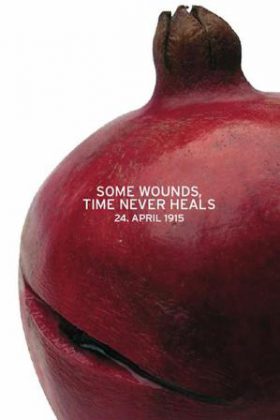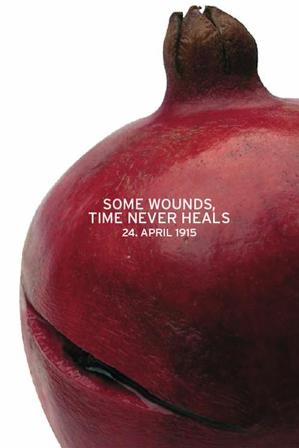
 By Ani Avetyan
By Ani Avetyan
Azad-Hye
For two days, Armenian and non-Armenian scientists and experts, who have come from all over the world, discussed the mechanisms and methods of a more effective reaction against Turkey's denial.
“Let no one presume that in 2015 the Armenian nation's struggle will come to an end. Through the events dedicated to the one hundredth anniversary of the Armenian Genocide, we shall prove that we will struggle to the end”.- said Hayk Demoyan, the Director of the Armenian Genocide Museum-Institute in Yerevan and the Secretary of the State Commission coordinating these events, during the international conference entitled “The Armenian Genocide: At the threshold of a century of challenges”, organized by the commission.
Turkish state archives, German and Austrian archives and testimonies by ambassadors who had worked in Ottoman Turkey; these are the most effective sources to obtain proof against Turkey's denial, according to the researcher and historian of the Armenian Genocide Professor Vahakn Dadrian – Director of the Genocide Research in the Zoryan Institute: “The Turks consider me their main enemy and they call me An Armenian Dog”. He says that his main weapon is his perfect knowledge of the Turkish language. With that weapon, he's been searching, finding and publishing countless evidences from the Turkish government resources for thirty years now. He especially singles out the remaining documentaries of the lawsuits of the genocide organizers.
The gravity of the evidences does not force Turkey to acknowledge its crime, as for the denial, it's the result of power. “The powerful will never plead guilty and Turkey will go on denying. My only hope is the internal uproars.” -says the scientist.
Another scientist, Head of the Institute of Diaspora and Genocide Research at the Ruhr University in Bochum, Dr. Mihran Dabag, suggests his own method of struggle: “Currently we should focus on the recognition and internationalization of the Armenian Genocide, not with a general approach, but on fixing it in the universal memory with detailed researches”. He also says that, “there are a lot of gaps and a lot to do in order to achieve that. For example in 2014, the first “Memorial Museum” dedicated to WWI will be opened in Europe, but the Armenian Genocide is not represented there”.
Hayk Demoyan showed the participants some photos about the ongoing preparations. In 2015, the Museum of Armenian Genocide will be able to welcome two and a half times more visitors than before. “The materials will no longer be under the glass. Because of the recent museum technologies, the visitors will be able to see 100 times more material than today”, he stated.
Yair Auron, Israeli historian, scholar and expert specializing on Holocaust and Genocide studies, and senior lecturer at the Open University of Israel, had no doubt that Israel must recognize the Armenian Genocide. “I don't think it's impossible to happen in the near future, because there's a basis for it, the current geopolitical status, the issues with Turkey and of course the fact that Israel has witnessed the Holocaust. The universality of the issue is very important for so many members of the Knesset.”- said the scientist, adding: “Before this happens in the Knesset, the people of Israel are the ones ready for that. Their knowledge of the Armenian Genocide and therefore their outlooks are changing”. As far as the knowledge is concerned, Yair Auron has done a highly valuable work. With his initiative, the second course about the Armenian Genocide has started in the Open University, where 1500 students are attending.
The historian says that although suggestions to recognize the Armenian Genocide have been refused a couple of times in the Knesset, this time it sounds different, because, “This year, unlike the previous years, the issue is not being discussed in the security council, where discussions were closed and we weren't able to follow the process”.
We can confidently say that while the methods of struggling against Turkey's denial are being discussed in Yerevan, people are not inactive in Turkey too. As for the Armenians, and the fact that they are not ready for surprises, Turkologist Artak Shakaryan says: “If Erdogan sheds Davutoglu's tears on the Turkish state TV on the 24th of April, what will our next step be?”
Translated by Nanor Mikayelian
TEXT IN ARMENIAN
Թող ոչ ոք հույս չունենա, որ 2015 թվականին հայ ժողովրդի պայքարը կավարտվի
Անի Ավետյան
Ազատ-Հայ
Աշխարհի տարբեր երկրներից եկած, հայ և ոչ միայն, գիտնականներն ու փորձագետները 2 օր քննարկել են թուրքական ժխտողականության դեմ առավել արդյունավետ հակազդեցության մեխանիզմներն ու եղանակները:
Թող ոչ ոք հույս չունենա, որ 2015 թվականին հայ ժողովրդի պայքարը կավարտվի: Հարյուրամյակին նվիրված միջոցառումներով մենք պետք է ցույց տանք, որ պայքարելու ենք մինչև վերջ. Հայոց ցեղասպանության 100-րդ տարելիցին նվիրված միջոցառումները համակարգող պետական հանձնաժողովի քարտուղար Հայկ Դեմոյանի խոսքից հատված է` ասված հանձնաժողովի նախաձեռնությամբ կազմակերպված ?Հայոց ցեղասպանություն. Մարտահրավերներ հարյուրամյակի նախաշեմին? միջազգային գիտաժողովի ժամանակ:
Թուրքական պետական, գերմանական ու ավստրիական արխիվներ և Օսմանյան Թուրքիայում աշխատած դեսպանների վկայություններ. սրանք Թուրքիայի ուրացման դեմ ապացույցներ ձեռք բերելու ամենաարդյունավետ աղբյուրներն են ըստ ամերիկահայ գիտնական, Զորյան ինստիտուտի Ցեղասպանության ուսումնասիրման գծով տնօրեն պրոֆեսոր Վահագն Տատրեանի: ?Թուրքերը ինձ գլխավոր թշնամի են նկատում եւ ինձ էրմենի քոփակ, այսինքն հայ շուն են ասում?, – պատմում է պրոֆեսորը ու նշում, որ իր գլխավոր զենքը թուրքերենի կատարյալ իմացությունն է: Եվ այդ զենքով նա արդեն 30 տարի գտնում և հրապարակում է բազմաթիվ փաստեր հենց Թուրքիայի կառավարության աղբյուրներից: Առանձնացնում է հատկապես ցեղասպանության կազմակերպիչների դատավարություններից մնացած վավերագրերը:
Բայց ապացույցների ծանրությունն էլ Թուրքիային չի ստիպում ճանաչել ոճիրը, իսկ ուրանալն ուժի հետևանք է: ?Զորավորը երբեք իր հանցանքը չի խոստովանի: Եվ Թուրքիան կշարունակի ուրանալ: Իմ միակ հույսը ներքին խռովություններն են?, – նշում է գիտնականը:
Մեկ այլ գիտնական, Գերմանիայի Բոխում համալսարանի դասախոս, նույն համալսարանին կից Սփյուռքի և Ցեղասպանության ինստիտուտի տնօրեն, պրոֆեսոր, դոկտոր Միհրան Դաբաղը պայքարի իր եղանակն է առաջարկում. ?Ներկայումս պետք է կենտրոնանալ ոչ թե ընդհանրական մոտեցմամբ Հայոց Ցեղասպանության ճանաչման, միջազգայնացման, այլ՝ մանրամասն ուսումնասիրություններով` համամարդկային հիշողության մեջ ամրագրելու վրա?, -նկատում է նա` ավելացնելով, որ այդ ուղղությամբ դեռ բացեր ու անելիքներ կան, որովհետև, օրինակ, 2014 թվականին Եվրոպայում կստեղծվի Առաջին աշխարհամարտի ?Հիշողության թանգարանը?, որտեղ ներկայացված չէ Հայոց ցեղասպանությունը:
Փոխարենը Հայոց ցեղասպանության թանգարան-ինստիտուտի տնօրեն Հայկ Դեմոյանը նրան ու գիտաժողովի մյուս մասնակիցներին ներկայացրել է մի քանի նախագծային լուսանկար. 2015 թվականին թանգարանն այցելուներին դիմավորելու է 2.5 անգամ ընդլայնված, իսկ միայն ցուցադրությունների մասը` 2 անգամ: ?Այլևս չի լինելու նյութն ապակու տակ: Թանգարանային վերջին տեխնոլոգիանորով հագեցվածությունն այցելուներին հնարավորություն կտա տեսնել 100 անգամ ավելի շատ նյութ, քան այսօր?, – նշել է Հայկ Դեմոյանը:
Առանց այդ նյութերն ու ապացույցները տեսնելու էլ գիտաժողովին մասնակցող իսրայելցի պատմաբան, Իսրայելի բաց համալսարանի պրոֆեսոր Յաիր Աուրոն վստահ է` Իսրայելը պետք է ճանաչի Հայոց ցեղասպանությունը: ?Ես չեմ բացառում մոտ ապագայում դրա հավանականությունը, քանի որ բավական հիմք է ստեղծվել`ներկայիս աշխարհաքաղաքական իրավիճակը, Թուրքիայի հետ խնդիրները և, իհարկե, Հոլոքոստ տեսած Իսրայելի իրողությունը: Քնեսեթում շատերի համար է կարևոր Ցեղասպանություն և Հոլոքոստ եզրույթների ընդհանրությունը?,- նշել է գիտնականն ու ավելացրել, որ Քնեսեթից առաջ Իսրայելում հասարակությունն է պատրաստ դրան:
Հայոց ցեղասպանության մասին նրանց գիտելիքները, հետևաբար, հայացքներն են փոխվում: Իսկ գիտելիքների մասով հենց Յաիր Աուրոն է անգնահատելի աշխատանք կատարել: Նրա նախաձեռնությամբ է Իսրայելի բաց համալսարանում Հայոց ցեղասպանություն մասին 2 դասընթաց սկսվել, որին մոտ 1500 ուսանող է այցելում:
Պատմաբանը նշում է նաև, որ թեև մի քանի անգամ Քնեսեթում մերժվել են Հայոց ցեղասպանությունը ճանաչելու առաջարկները, այս անգամ կարծես թե իրերն այլ կերպ են դասավորվում, որովհետև. ?Այս տարի, ի տարբերություն նախորդների, հարցը չի քննարկվում Անվտանգության կոմիտեում, որտեղ քննարկումները փակ են ու մենք չէինք կարողանա հետևել դրանց ընթացքին?:
Վստահորեն կարող ենք ասել, որ մինչ Երևանում քննարկվում են Թուրքիայի ժխտողականության դեմ պայքարի միջոցները, Թուրքայում էլ անգործ չեն: Ու այստեղ պայքարի մի ճակատ էլ է ավելանում` նրանց նախատեսած քայլերի դեմ: Իսկ որ հայերը պատրաստ չեն անակնկալների, թուրքագետ Արտակ Շաքարյանն է նշում, ասելով. ?Եթե ապրիլի 24-ին Էրդողանը թուրքական պետական հեռուստաալիքի եթերում Դավութօղլուի արցունքներից թափի, ո՞րն է լինելու մեր հաջորդ քայլը?:
